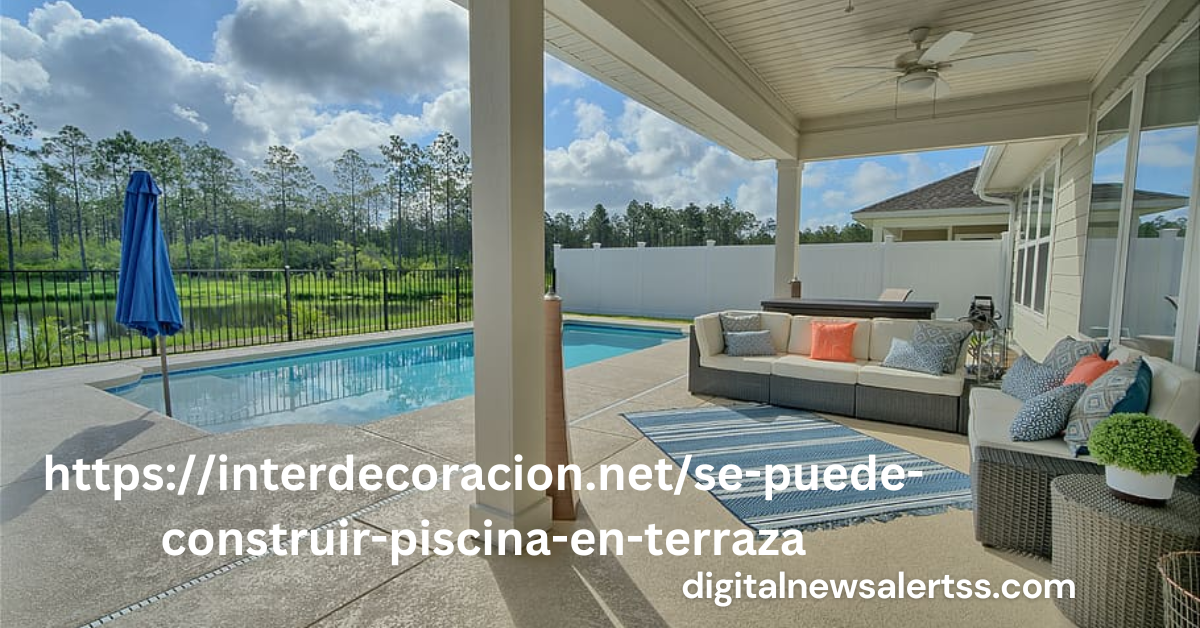Introduction
Imagine lounging by a pool on a warm day, the water shimmering under the sun as you relax in the comfort of your own home. Now, imagine that pool being on your terrace, high above the bustling city streets, offering a private oasis in the sky. But is it really possible to build a pool on a terrace?
Yes, it’s possible to build a pool on a terrace, but it requires careful planning, structural analysis, and consideration of legal regulations.
The answer is yes, but it comes with a unique set of challenges and considerations. This guide will walk you through everything you need to know about https://interdecoracion.net/se-puede-construir-piscina-en-terraza (Building a pool on a terrace), from structural requirements to legal considerations, and even some creative alternatives.
Understanding the Basics: Can You Build a Pool on a Terrace?
The concept of https://interdecoracion.net/se-puede-construir-piscina-en-terraza (Building a pool on a terrace) might sound like a dream, but it’s a dream that can come true with the right planning and execution. However, before diving into the idea, it’s essential to understand that not all terraces are created equal. The feasibility of constructing a pool on a terrace depends on several factors, including the structural integrity of the building, local building codes, and the type of pool you wish to install.
Structural Integrity: The Foundation of Your Terrace Pool
The most critical aspect of https://interdecoracion.net/se-puede-construir-piscina-en-terraza (Building a pool on a terrace) is the structural integrity of the building. Terraces are typically designed to support the weight of outdoor furniture, plants, and people, but adding a pool introduces a significant amount of additional weight. Water is heavy, with one cubic meter weighing approximately one ton, so even a small pool can add a considerable load to your terrace.
Before proceeding with any plans, it’s crucial to consult with a structural engineer who can assess whether your terrace can support the weight of a pool. The engineer will evaluate the load-bearing capacity of the terrace, considering both the weight of the water and the pool structure itself. If your terrace isn’t designed to handle this load, reinforcing the structure might be necessary, which can add to the complexity and cost of the project.
Local Building Codes: Navigating Legal Requirements
In addition to structural considerations, you’ll need to navigate local building codes and regulations. https://interdecoracion.net/se-puede-construir-piscina-en-terraza (Building a pool on a terrace) isn’t as simple as installing it in your backyard; there are specific rules and permits required for such a project.
Building codes vary from one location to another, but they generally include requirements for structural safety, waterproofing, drainage, and access. You’ll likely need to obtain a building permit before starting construction, and in some cases, you might need to present detailed architectural and engineering plans to the local authorities for approval.
It’s also essential to consider the impact of your project on neighboring properties. Pools can create noise, and water leaks could potentially cause damage to other units in multi-story buildings. Ensuring that your pool complies with all relevant regulations will help prevent legal issues down the line.
Types of Pools Suitable for Terraces
Once you’ve determined that your terrace can support a pool and that you can meet all legal requirements, the next step is to choose the right type of pool. Not all pools are suitable for installation on a terrace, so it’s important to select one that meets both your aesthetic preferences and the structural limitations of your space.
1. Inflatable Pools
Inflatable pools are a popular choice for terraces because they are lightweight and easy to install. These pools are made from durable materials like PVC and can be set up or taken down as needed. While they don’t offer the same level of luxury as a permanent pool, they provide a convenient and affordable option for enjoying a dip on a hot day.
Pros:
- Easy to set up and remove
- Affordable
- Lightweight, reducing structural concerns
Cons:
- Limited in size and depth
- Less durable than permanent options
- Requires regular maintenance and careful handling to avoid punctures
2. Above-Ground Pools
Above-ground pools offer a more permanent solution compared to inflatable pools, while still being relatively lightweight and easier to install than in-ground pools. These pools are typically made from steel, resin, or aluminum and come in various shapes and sizes.
Pros:
- More durable than inflatable pools
- Available in larger sizes
- Can be customized with decking and landscaping
Cons:
- Heavier than inflatable pools, requiring careful structural assessment
- More expensive and time-consuming to install
- Permanent installation may require additional permits
3. In-Ground Pools
In-ground pools are the most luxurious option, offering a seamless, integrated look with the terrace. However, they are also the most challenging to install on a terrace due to their weight and the need for significant structural support.
Pros:
- High-end, luxurious appearance
- Customizable shapes and sizes
- Long-lasting and durable
Cons:
- Requires extensive structural modifications and reinforcement
- Expensive and time-consuming to install
- May require significant permits and approvals
4. Plunge Pools
Plunge pools are a hybrid option, offering the benefits of an in-ground pool but on a smaller scale. These pools are designed for relaxation rather than swimming and can be a great addition to a terrace.
Pros:
- Smaller and lighter than traditional in-ground pools
- Ideal for relaxation and cooling off
- Can be customized with features like jets and heaters
Cons:
- Limited space for swimming
- Still requires significant structural support
- May not be suitable for large groups
Waterproofing and Drainage: Essential Considerations
Waterproofing and drainage are two of the most critical aspects of https://interdecoracion.net/se-puede-construir-piscina-en-terraza (Building a pool on a terrace). Without proper waterproofing, water from the pool can seep into the building’s structure, causing damage over time. Similarly, inadequate drainage can lead to water pooling on the terrace, which can create a slipping hazard and further structural issues.
Waterproofing
Waterproofing involves creating a barrier that prevents water from penetrating the terrace’s surface. This can be achieved using specialized membranes, coatings, or sealants. It’s essential to choose high-quality materials and to have the waterproofing installed by a professional to ensure it is effective and long-lasting.
Drainage
Proper drainage is equally important. The terrace should have a slight slope to direct water away from the pool and into drainage systems. Installing additional drains around the pool area can help manage any water that splashes out of the pool, preventing it from accumulating on the terrace surface.
Heating and Filtration Systems
If you’re planning to build a permanent pool on your terrace, you’ll also need to consider heating and filtration systems. These systems are essential for maintaining the water quality and ensuring a comfortable swimming experience.
Heating
Heating systems allow you to use your pool year-round, even in cooler weather. Options include electric heaters, gas heaters, and solar heating systems. The choice of heating system will depend on your climate, budget, and energy preferences.
Filtration
Filtration systems keep the pool water clean by removing debris, bacteria, and other contaminants. Common filtration options include sand filters, cartridge filters, and diatomaceous earth filters. Regular maintenance of the filtration system is essential to ensure the water remains safe and clear.
Creative Alternatives to Traditional Pools
If the idea of building a traditional pool on your terrace seems too challenging or expensive, there are several creative alternatives that can still provide a refreshing and relaxing experience.
1. Hot Tubs
Hot tubs are a great alternative to traditional pools, offering a relaxing space to unwind while taking up less space and requiring less structural support. They can be installed above ground or recessed into the terrace floor.
2. Swim Spas
Swim spas combine the features of a pool and a hot tub, offering a compact space for both exercise and relaxation. These units are typically smaller and lighter than traditional pools, making them a good option for terraces.
3. Water Features
If you’re looking for a way to add a touch of water to your terrace without the complexity of a full pool, consider installing a water feature like a fountain or a small pond. These features can create a soothing atmosphere and enhance the aesthetics of your outdoor space.
Cost Considerations
https://interdecoracion.net/se-puede-construir-piscina-en-terraza (Building a pool on a terrace) is a significant investment, and the cost can vary widely depending on the type of pool, the complexity of the installation, and the need for structural modifications. Here’s a rough breakdown of the potential costs:
- Structural Analysis and Reinforcement: $5,000 – $50,000
- Permits and Legal Fees: $1,000 – $10,000
- Pool Installation:
- Inflatable Pool: $100 – $1,000
- Above-Ground Pool: $3,000 – $15,000
- In-Ground Pool: $20,000 – $100,000
- Plunge Pool: $10,000 – $30,000
- Waterproofing and Drainage: $2,000 – $15,000
- Heating and Filtration Systems: $1,000 – $10,000
- Additional Features (Decking, Landscaping, etc.): $5,000 – $50,000
Maintenance and Safety Considerations
Once your pool is installed, ongoing maintenance and safety are crucial to ensure it remains a safe and enjoyable space. Regular cleaning, water testing, and equipment maintenance are essential to keep the pool in good condition. Additionally, safety features like handrails, non-slip surfaces, and pool covers should be installed to prevent accidents, especially if children or pets will be using the terrace.
Environmental Considerations
https://interdecoracion.net/se-puede-construir-piscina-en-terraza (Building a pool on a terrace) also comes with environmental considerations. Pools consume significant amounts of water and energy, and if not managed properly, they can contribute to environmental issues like water scarcity and pollution. Consider implementing eco-friendly practices, such as using a solar heating system, installing a pool cover to reduce evaporation, and choosing energy-efficient pumps and filters.
Conclusion: Is a Terrace Pool Right for You?
https://interdecoracion.net/se-puede-construir-piscina-en-terraza (Building a pool on a terrace) is a unique and exciting project that can transform your outdoor space into a luxurious retreat. However, it requires careful planning, significant investment, and ongoing maintenance. By understanding the structural, legal, and environmental considerations, you can make an informed decision about whether a terrace pool is right for you.
FAQs
Can any terrace support a pool?
Not all terraces can support the weight of a pool. A structural engineer must assess the load-bearing capacity to determine if reinforcement is needed.
Do I need a permit to build a pool on my terrace?
Yes, https://interdecoracion.net/se-puede-construir-piscina-en-terraza (Building a pool on a terrace) typically requires permits. Local building codes will dictate the specific requirements and approvals needed.
What are the best types of pools for a terrace?
Inflatable pools, above-ground pools, and plunge pools are commonly recommended for terraces due to their lighter weight and easier installation.
How do I waterproof my terrace for a pool?
Waterproofing involves applying specialized membranes or coatings to the terrace surface to prevent water from penetrating and causing structural damage.
What maintenance is required for a terrace pool?
Regular cleaning, water testing, and equipment checks are necessary. Proper drainage and waterproofing maintenance are also crucial to prevent leaks.
Can I heat my terrace pool?
Yes, you can install a heating system such as electric, gas, or solar heaters to use the pool year-round.
Are there alternatives to building a traditional pool on a terrace?
Alternatives include hot tubs, swim spas, and water features, which require less space and structural support while still enhancing your terrace.



